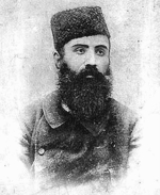
Hristo Uzunov
Encyclopedia
Hristo Dimitrov Uzunov (22 February 1878, Ohrid
– 24 April 1905, Tser, near Kichevo
) was a Bulgarian
revolutionary, head of the Ohrid branch of the Internal Macedonian Revolutionary Organization and its ideological leader in the Ohrid region. Uzunov is considered as ethnic Macedonian in Republic of Macedonia.
. He actively took part in the Ilinden Uprising in 1903. Between 1904 and 1905 he focused at resisting the Serbian guerrilla campaigns in Macedonia
and tried to resolve of the organization's internal problems.
) entered Bitola
and after that Kichevo in order to gain control of that region. On 23 April 1905, they entered the village of Tser in the region of Kichevo, together with the cheta of Kichevo voivode Vancho Sarbakov. The night of April the 24th they were surrounded by a great number of Ottoman forces and after using up their ammunition, facing surrender, they decided to commit suicide. Uzunov then wrote a short letter addressed to all "honourable revoulutionaries" and after that he and his men killed themselves. His grave is located in Tser, where he died.
Ohrid
Ohrid is a city on the eastern shore of Lake Ohrid in the Republic of Macedonia. It has about 42,000 inhabitants, making it the seventh largest city in the country. The city is the seat of Ohrid Municipality. Ohrid is notable for having once had 365 churches, one for each day of the year and has...
– 24 April 1905, Tser, near Kichevo
Kicevo
Kičevo is a city in the western part of the Republic of Macedonia, located in a valley in the south-eastern slopes of Mount Bistra, between the cities of Ohrid and Gostivar. The capital Skopje is 112 km away. The city of Kičevo is the seat of Kičevo Municipality.-Population:The municipality...
) was a Bulgarian
Bulgarians
The Bulgarians are a South Slavic nation and ethnic group native to Bulgaria and neighbouring regions. Emigration has resulted in immigrant communities in a number of other countries.-History and ethnogenesis:...
revolutionary, head of the Ohrid branch of the Internal Macedonian Revolutionary Organization and its ideological leader in the Ohrid region. Uzunov is considered as ethnic Macedonian in Republic of Macedonia.
Revolutionary life
Hristo Uzunov was born in 1878 in Ohrid, then in Ottoman Empire. Both his father and mother were active in the Bulgarian revolutionary movement. It is believed that Uzunov became member of the revolutionary movement in 1896, while he studied in Bulgarian Men's High School of ThessalonikiBulgarian Men's High School of Thessaloniki
The Sts. Cyril and Methodius Bulgarian Men's High School of Thessaloniki was the first Bulgarian high school in Macedonia. One of the most influential Bulgarian educational centres in Macedonia and Southern Thrace, it was founded in autumn 1880 in Ottoman Thessaloniki and existed until...
. He actively took part in the Ilinden Uprising in 1903. Between 1904 and 1905 he focused at resisting the Serbian guerrilla campaigns in Macedonia
Macedonia (region)
Macedonia is a geographical and historical region of the Balkan peninsula in southeastern Europe. Its boundaries have changed considerably over time, but nowadays the region is considered to include parts of five Balkan countries: Greece, the Republic of Macedonia, Bulgaria, Albania, Serbia, as...
and tried to resolve of the organization's internal problems.
Death
In 1905 Uzunov with his band (chetaCheta
Cheta was an armed band, organized by the Christian population on the territory of the Ottoman Empire, aiming at anti-Turkish activity. The cheta was usually led by a leader, called voivoda. The members of the chetas were called chetnik....
) entered Bitola
Bitola
Bitola is a city in the southwestern part of the Republic of Macedonia. The city is an administrative, cultural, industrial, commercial, and educational centre. It is located in the southern part of the Pelagonia valley, surrounded by the Baba and Nidže mountains, 14 km north of the...
and after that Kichevo in order to gain control of that region. On 23 April 1905, they entered the village of Tser in the region of Kichevo, together with the cheta of Kichevo voivode Vancho Sarbakov. The night of April the 24th they were surrounded by a great number of Ottoman forces and after using up their ammunition, facing surrender, they decided to commit suicide. Uzunov then wrote a short letter addressed to all "honourable revoulutionaries" and after that he and his men killed themselves. His grave is located in Tser, where he died.

